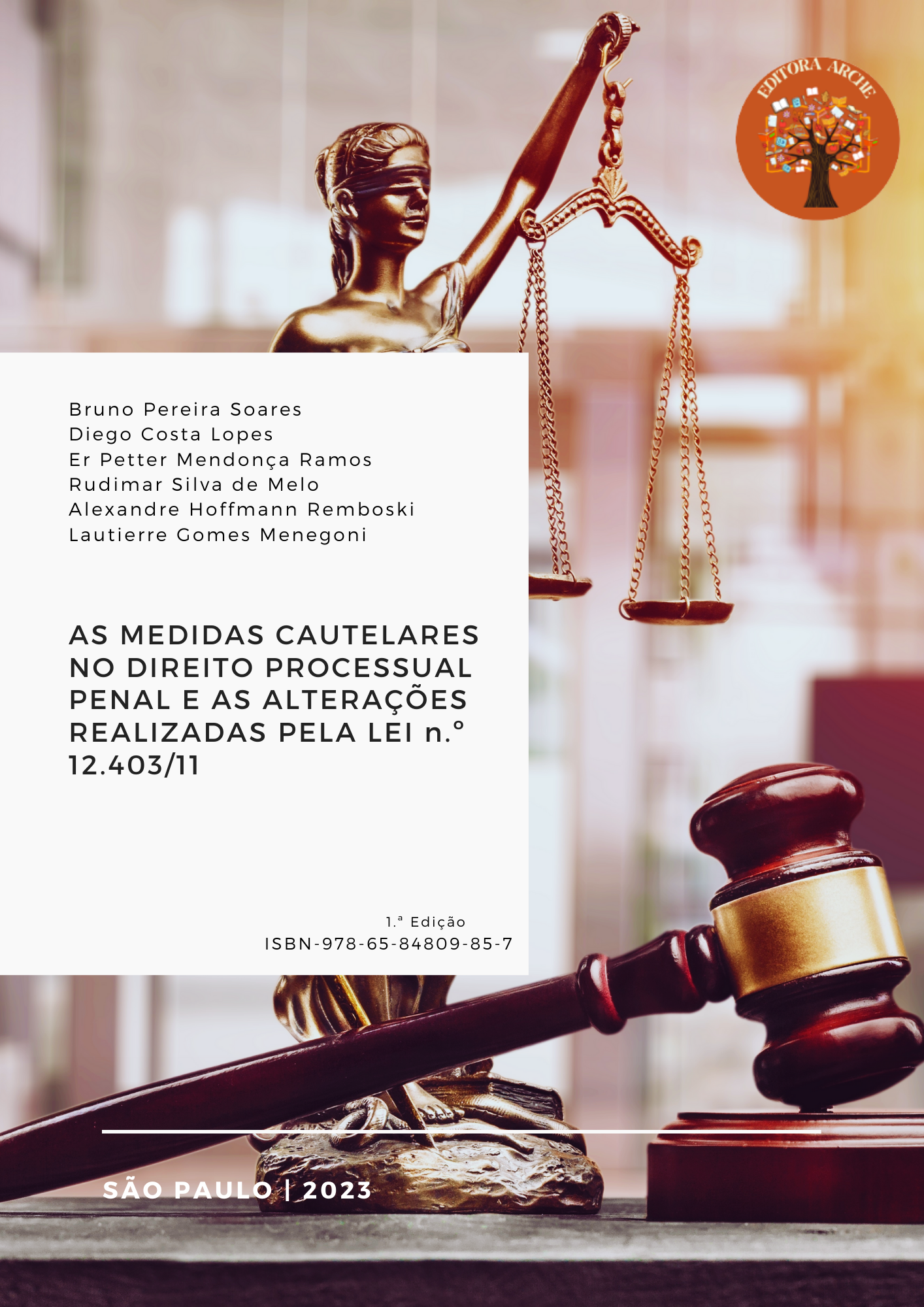PRECAUTIONARY MEASURES IN CRIMINAL PROCEDURAL LAW AND THE CHANGES MADE BY LAW No. 12,403/11
Keywords:
Freedom. Precautionary Measures. Prisons. Criminal proceedings.Abstract
The book "Precautionary Measures in Criminal Procedural Law and the Amendments Made by Law No. 12,403/11 is a work that addresses precautionary measures in Brazilian criminal proceedings, with emphasis on the changes brought by Law No. 12,403/11. The work is of great relevance for law students and professionals, as well as for those who wish to better understand the functioning of the criminal justice system in Brazil.
Initially, the work deals with the Fundamentals of precautionary measures, deals with the fundamentals of precautionary measures in Brazilian Criminal Procedural Law. Precautionary measures are intended to ensure the effectiveness of criminal prosecution and the application of criminal law, preventing the accused from fleeing, destroying evidence, threatening public order, among others.
In sequence, the book focuses on precautionary measures of a personal nature it addresses precautionary measures of a personal nature, which are those that directly affect the freedom of the accused. Among precautionary measures of a personal nature, preventive detention, temporary imprisonment and precautionary measures alternative to imprisonment stand out.
Entitled, Precautionary measures depriving liberty, the last chapter of the book deals specifically with precautionary measures depriving liberty, being those resulting in the arrest of the accused. Among precautionary measures depriving liberty, preventive detention is the best known and most used in Brazil, being applied when the legal requirements for its enactment are present.
In addition to preventive detention, there are other precautionary measures that deprive liberty, such as temporary detention, which can be decreed in specific cases, such as the investigation of heinous or high-profile crimes, for example.
Precautionary measures depriving liberty are exceptional and should only be applied in cases of extreme necessity, when precautionary measures alternative to imprisonment are not sufficient to guarantee the effectiveness of criminal prosecution.
Law No. 12,403/11 brought important changes to precautionary measures in the Brazilian criminal procedure, especially with regard to preventive detention and precautionary measures alternative to imprisonment. The law made the conditions for enacting preventive detention more flexible, limiting it to cases of extreme necessity, and expanded the list of alternative precautionary measures to imprisonment.
The easing of preventive detention promoted by Law nº 12.403/11 aims to avoid the abusive use of this precautionary measure, which is often decreed indiscriminately, without due legal support. With the new law, preventive detention is now applied only in exceptional cases, when it is not possible to apply another precautionary measure.
In addition to making preventive detention more flexible, Law No. 12,403/11 expanded the list of alternative precautionary measures to imprisonment. Among the alternative precautionary measures to imprisonment, the law included house arrest, electronic monitoring, banning access to certain places and banning contact with certain people. In addition, the law allowed the application of precautionary measures other than imprisonment in cases of heinous and similar crimes, provided that the accused is not a repeat offender of this nature.
The purpose of expanding the list of alternative precautionary measures to prison was to avoid overcrowding in prisons and guarantee respect for the fundamental rights of the accused. With the application of less onerous precautionary measures, it is possible to guarantee the effectiveness of the criminal procedure without unduly impairing the individual freedom of the accused.
Thus, Law No. 12,403/11 also established deadlines for reviewing precautionary measures of a personal nature. From then on, precautionary measures must be reviewed every 90 days, under penalty of being illegal. This measure aims to ensure that precautionary measures are applied only for the necessary time and that they are not used as a means of anticipating the penalty.
In short, the book "Precautionary measures in Criminal Procedural Law and the changes made by Law No. 12.403/11" presents an in-depth analysis of the main changes promoted by that law in the scope of precautionary measures in criminal proceedings. The changes brought about by the law were aimed at ensuring the effectiveness of the criminal procedure without unduly impairing the individual freedom of the accused.
The easing of preventive detention and the expansion of the list of alternative precautionary measures to prison were important advances in the sense of guaranteeing respect for the fundamental rights of the accused and avoiding overcrowding in prisons. In addition, Law No. 12,403/11 established deadlines for the review of precautionary measures, which helps to prevent abuse and guarantee the application of precautionary measures for the time strictly necessary.
Downloads

Downloads
Published
How to Cite
License
Atribuição CC BY
